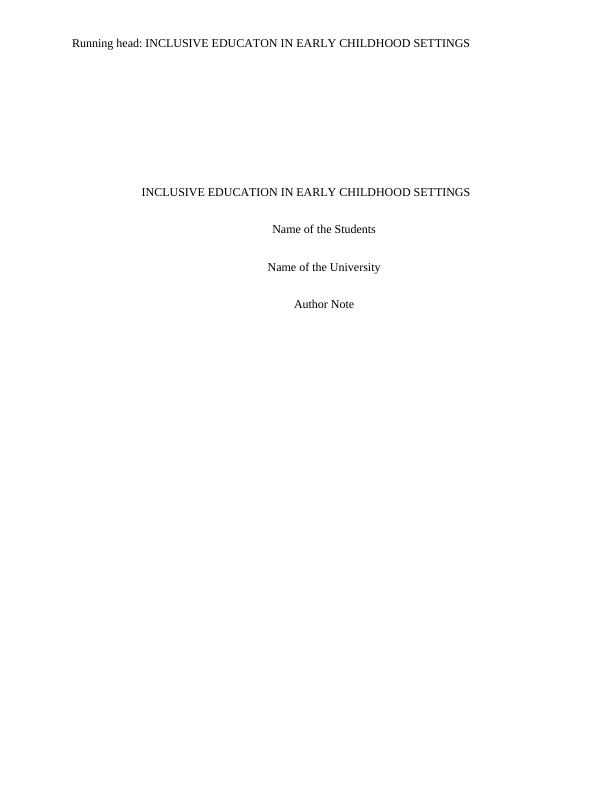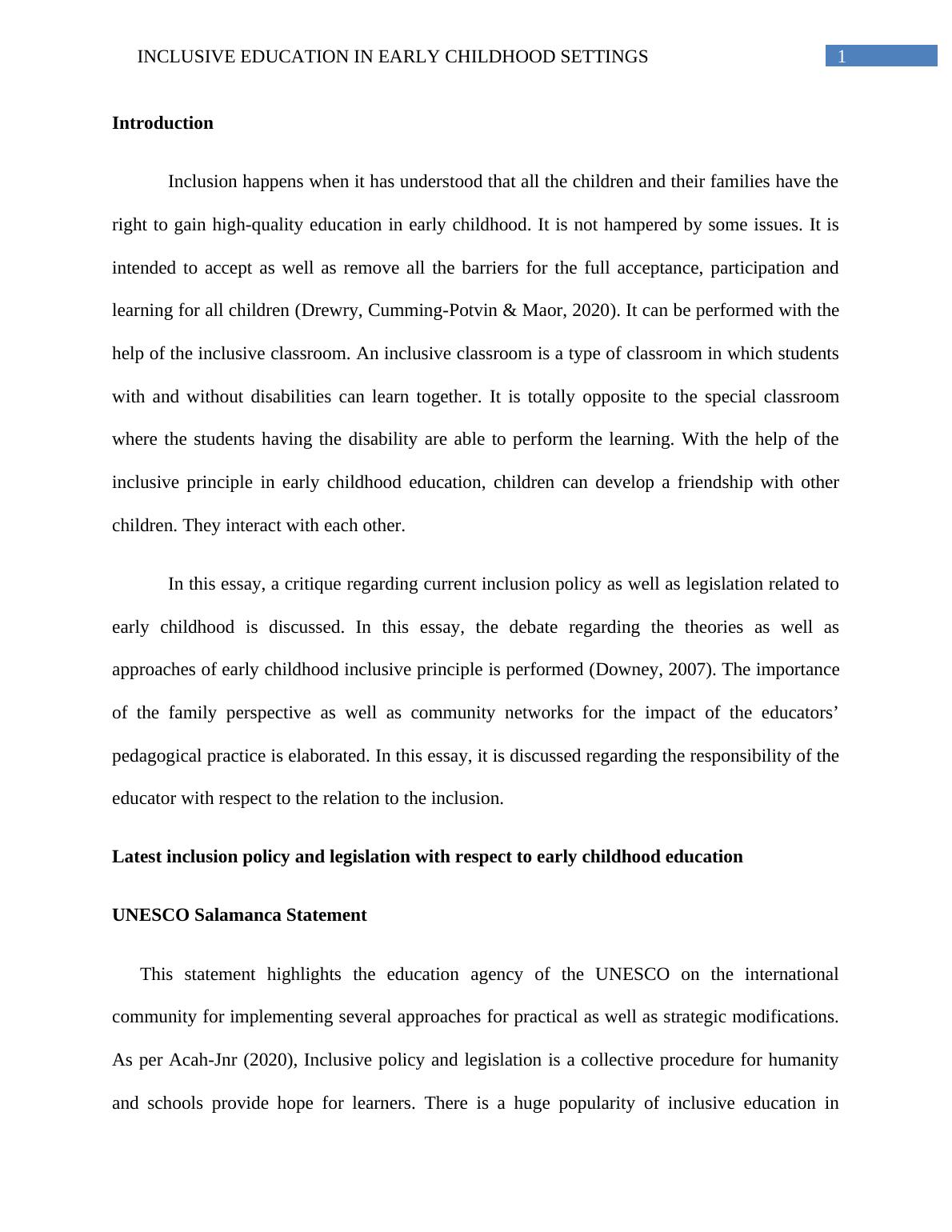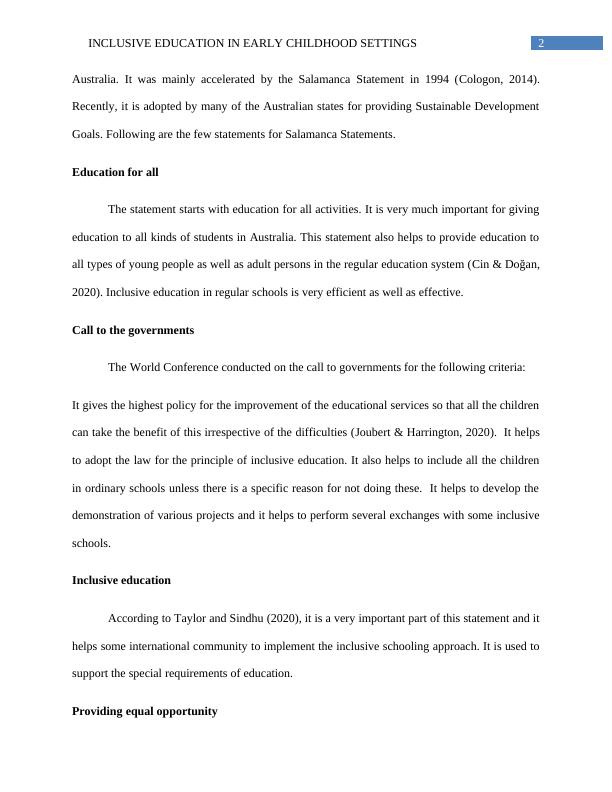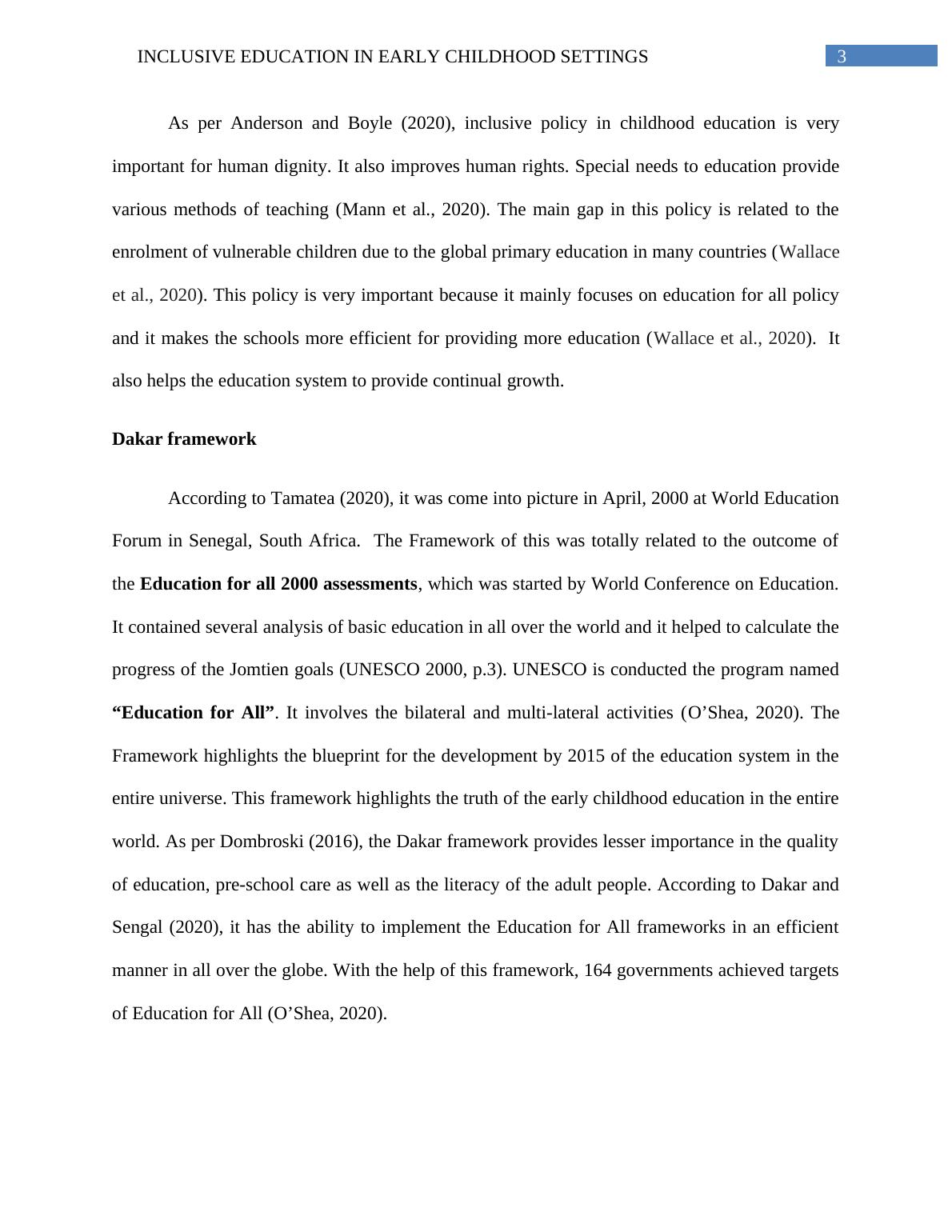Inclusive Education In Early Childhood
Added on 2022-08-08
15 Pages3876 Words50 Views
Running head: INCLUSIVE EDUCATON IN EARLY CHILDHOOD SETTINGS
INCLUSIVE EDUCATION IN EARLY CHILDHOOD SETTINGS
Name of the Students
Name of the University
Author Note
INCLUSIVE EDUCATION IN EARLY CHILDHOOD SETTINGS
Name of the Students
Name of the University
Author Note

1INCLUSIVE EDUCATION IN EARLY CHILDHOOD SETTINGS
Introduction
Inclusion happens when it has understood that all the children and their families have the
right to gain high-quality education in early childhood. It is not hampered by some issues. It is
intended to accept as well as remove all the barriers for the full acceptance, participation and
learning for all children (Drewry, Cumming-Potvin & Maor, 2020). It can be performed with the
help of the inclusive classroom. An inclusive classroom is a type of classroom in which students
with and without disabilities can learn together. It is totally opposite to the special classroom
where the students having the disability are able to perform the learning. With the help of the
inclusive principle in early childhood education, children can develop a friendship with other
children. They interact with each other.
In this essay, a critique regarding current inclusion policy as well as legislation related to
early childhood is discussed. In this essay, the debate regarding the theories as well as
approaches of early childhood inclusive principle is performed (Downey, 2007). The importance
of the family perspective as well as community networks for the impact of the educators’
pedagogical practice is elaborated. In this essay, it is discussed regarding the responsibility of the
educator with respect to the relation to the inclusion.
Latest inclusion policy and legislation with respect to early childhood education
UNESCO Salamanca Statement
This statement highlights the education agency of the UNESCO on the international
community for implementing several approaches for practical as well as strategic modifications.
As per Acah-Jnr (2020), Inclusive policy and legislation is a collective procedure for humanity
and schools provide hope for learners. There is a huge popularity of inclusive education in
Introduction
Inclusion happens when it has understood that all the children and their families have the
right to gain high-quality education in early childhood. It is not hampered by some issues. It is
intended to accept as well as remove all the barriers for the full acceptance, participation and
learning for all children (Drewry, Cumming-Potvin & Maor, 2020). It can be performed with the
help of the inclusive classroom. An inclusive classroom is a type of classroom in which students
with and without disabilities can learn together. It is totally opposite to the special classroom
where the students having the disability are able to perform the learning. With the help of the
inclusive principle in early childhood education, children can develop a friendship with other
children. They interact with each other.
In this essay, a critique regarding current inclusion policy as well as legislation related to
early childhood is discussed. In this essay, the debate regarding the theories as well as
approaches of early childhood inclusive principle is performed (Downey, 2007). The importance
of the family perspective as well as community networks for the impact of the educators’
pedagogical practice is elaborated. In this essay, it is discussed regarding the responsibility of the
educator with respect to the relation to the inclusion.
Latest inclusion policy and legislation with respect to early childhood education
UNESCO Salamanca Statement
This statement highlights the education agency of the UNESCO on the international
community for implementing several approaches for practical as well as strategic modifications.
As per Acah-Jnr (2020), Inclusive policy and legislation is a collective procedure for humanity
and schools provide hope for learners. There is a huge popularity of inclusive education in

2INCLUSIVE EDUCATION IN EARLY CHILDHOOD SETTINGS
Australia. It was mainly accelerated by the Salamanca Statement in 1994 (Cologon, 2014).
Recently, it is adopted by many of the Australian states for providing Sustainable Development
Goals. Following are the few statements for Salamanca Statements.
Education for all
The statement starts with education for all activities. It is very much important for giving
education to all kinds of students in Australia. This statement also helps to provide education to
all types of young people as well as adult persons in the regular education system (Cin & Doğan,
2020). Inclusive education in regular schools is very efficient as well as effective.
Call to the governments
The World Conference conducted on the call to governments for the following criteria:
It gives the highest policy for the improvement of the educational services so that all the children
can take the benefit of this irrespective of the difficulties (Joubert & Harrington, 2020). It helps
to adopt the law for the principle of inclusive education. It also helps to include all the children
in ordinary schools unless there is a specific reason for not doing these. It helps to develop the
demonstration of various projects and it helps to perform several exchanges with some inclusive
schools.
Inclusive education
According to Taylor and Sindhu (2020), it is a very important part of this statement and it
helps some international community to implement the inclusive schooling approach. It is used to
support the special requirements of education.
Providing equal opportunity
Australia. It was mainly accelerated by the Salamanca Statement in 1994 (Cologon, 2014).
Recently, it is adopted by many of the Australian states for providing Sustainable Development
Goals. Following are the few statements for Salamanca Statements.
Education for all
The statement starts with education for all activities. It is very much important for giving
education to all kinds of students in Australia. This statement also helps to provide education to
all types of young people as well as adult persons in the regular education system (Cin & Doğan,
2020). Inclusive education in regular schools is very efficient as well as effective.
Call to the governments
The World Conference conducted on the call to governments for the following criteria:
It gives the highest policy for the improvement of the educational services so that all the children
can take the benefit of this irrespective of the difficulties (Joubert & Harrington, 2020). It helps
to adopt the law for the principle of inclusive education. It also helps to include all the children
in ordinary schools unless there is a specific reason for not doing these. It helps to develop the
demonstration of various projects and it helps to perform several exchanges with some inclusive
schools.
Inclusive education
According to Taylor and Sindhu (2020), it is a very important part of this statement and it
helps some international community to implement the inclusive schooling approach. It is used to
support the special requirements of education.
Providing equal opportunity

3INCLUSIVE EDUCATION IN EARLY CHILDHOOD SETTINGS
As per Anderson and Boyle (2020), inclusive policy in childhood education is very
important for human dignity. It also improves human rights. Special needs to education provide
various methods of teaching (Mann et al., 2020). The main gap in this policy is related to the
enrolment of vulnerable children due to the global primary education in many countries (Wallace
et al., 2020). This policy is very important because it mainly focuses on education for all policy
and it makes the schools more efficient for providing more education (Wallace et al., 2020). It
also helps the education system to provide continual growth.
Dakar framework
According to Tamatea (2020), it was come into picture in April, 2000 at World Education
Forum in Senegal, South Africa. The Framework of this was totally related to the outcome of
the Education for all 2000 assessments, which was started by World Conference on Education.
It contained several analysis of basic education in all over the world and it helped to calculate the
progress of the Jomtien goals (UNESCO 2000, p.3). UNESCO is conducted the program named
“Education for All”. It involves the bilateral and multi-lateral activities (O’Shea, 2020). The
Framework highlights the blueprint for the development by 2015 of the education system in the
entire universe. This framework highlights the truth of the early childhood education in the entire
world. As per Dombroski (2016), the Dakar framework provides lesser importance in the quality
of education, pre-school care as well as the literacy of the adult people. According to Dakar and
Sengal (2020), it has the ability to implement the Education for All frameworks in an efficient
manner in all over the globe. With the help of this framework, 164 governments achieved targets
of Education for All (O’Shea, 2020).
As per Anderson and Boyle (2020), inclusive policy in childhood education is very
important for human dignity. It also improves human rights. Special needs to education provide
various methods of teaching (Mann et al., 2020). The main gap in this policy is related to the
enrolment of vulnerable children due to the global primary education in many countries (Wallace
et al., 2020). This policy is very important because it mainly focuses on education for all policy
and it makes the schools more efficient for providing more education (Wallace et al., 2020). It
also helps the education system to provide continual growth.
Dakar framework
According to Tamatea (2020), it was come into picture in April, 2000 at World Education
Forum in Senegal, South Africa. The Framework of this was totally related to the outcome of
the Education for all 2000 assessments, which was started by World Conference on Education.
It contained several analysis of basic education in all over the world and it helped to calculate the
progress of the Jomtien goals (UNESCO 2000, p.3). UNESCO is conducted the program named
“Education for All”. It involves the bilateral and multi-lateral activities (O’Shea, 2020). The
Framework highlights the blueprint for the development by 2015 of the education system in the
entire universe. This framework highlights the truth of the early childhood education in the entire
world. As per Dombroski (2016), the Dakar framework provides lesser importance in the quality
of education, pre-school care as well as the literacy of the adult people. According to Dakar and
Sengal (2020), it has the ability to implement the Education for All frameworks in an efficient
manner in all over the globe. With the help of this framework, 164 governments achieved targets
of Education for All (O’Shea, 2020).

End of preview
Want to access all the pages? Upload your documents or become a member.
Related Documents
Early Childhood Education and Care in Singaporelg...
|10
|2708
|154
Inclusive Education in Early Childhood Settingslg...
|14
|3896
|129
Inclusive Education in Early Childhood - Essaylg...
|12
|3729
|49
Historical, Political, and Curricular Rationales for Inclusive Educationlg...
|4
|1745
|78
Salamanca Statement and Frameworklg...
|7
|2041
|37
Inclusive Early Childhood Education | Reportlg...
|11
|2912
|22
